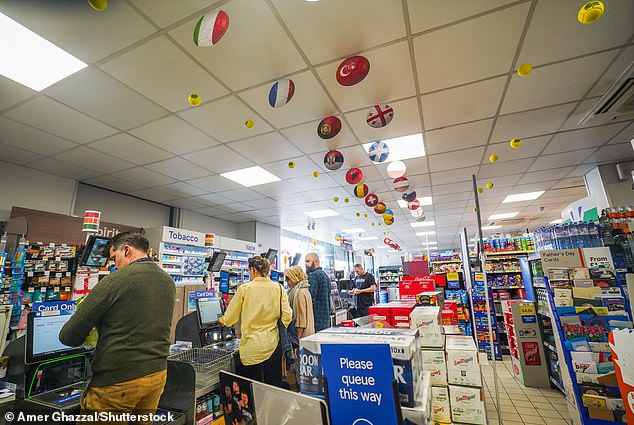Labour gloom sees consumer confidence fall ahead of ‘painful’ autumn budget
Consumer confidence took a hit in September as households worried about possible tax hikes in the upcoming budget, a closely watched index showed.
Prime Minister Keir Starmer’s warnings of a “painful” autumn budget, combined with Chancellor of the Exchequer Rachel Reeves’ claims of a £22bn “black hole”, the abolition of the winter fuel surcharge and a failure to suppress rumours of tax rises, have sent household confidence plummeting.
The consumer confidence index of market research agency GfK fell to minus 20 in September.
The last time the index fell this much was in April 2022, following Russia’s invasion of Ukraine, which sent energy costs soaring.
Decreasing: GfK’s consumer confidence index for September fell to -20
According to GfK, the data did not provide “encouraging news” for the new Labour government, which was initially elected with much optimism.
Neil Bellamy, director of consumer insights at GfK, said: ‘Consumer confidence has returned us to similar levels to the start of the year.’
He added: ‘Despite stable inflation and the prospect of further base rate cuts, this is not encouraging news for the new UK government.’
Bellamy said of the autumn budget: ‘Strong consumer confidence is important because it supports economic growth and significantly increases consumers’ willingness to spend.
‘Following the withdrawal of the Winter Fuel Payment and clear warnings of further difficult decisions on tax, spending and social security, consumers are eagerly awaiting the budget decisions on 30 October.’
Britons have been warned they can expect a “painful” Budget on October 30, with rumours suggesting a raft of tax rises are in the offing.
Bank of England Governor Andrew Bailey said on Thursday he believes underlying confidence is rising but consumers “want to see evidence that this will continue”.
Retail sales up in August
Despite lower consumer confidence, retailers saw sales rise last month thanks to summer sales discounts and warmer weather, official estimates show.
Grocery sales provided a big boost to the retail sector in August, with annual sales rising to their highest level since summer 2021, the Office for National Statistics said.
Total retail sales, which measure the amount bought, rose 1 percent in August, the ONS said. Most analysts are forecasting an increase of around 0.4 percent.

Boost: Retailers saw sales rise last month, ONS data shows
The figure follows a 0.7 percent increase in volume in July, revised upwards from an earlier estimate of a 0.5 percent increase, as discounts and sporting events, including the European Championship, boosted sales.
Sales volumes rose 1.2 percent in the three months to August compared with the three months to May.
Grant Fitzner, chief economist at the ONS, said: ‘Retail sales rose in August as warmer weather and seasonal sales boosted sales, particularly in clothing and grocery stores.’
He added: ‘Supermarkets in particular contributed to the largest annual increase in food sales since summer 2021.
‘Looking at the broader picture, retail sales also rose over the three-month and year-on-year period, following strong growth from online retailers. However, sales remain slightly below their pre-pandemic levels overall.’
Kris Hamer, director of insight at the British Retail Consortium, said: ‘With summer in full swing, sales have increased significantly in August.
‘Computers performed well as consumers were encouraged to upgrade their technology thanks to extensive summer sales, and students prepared for the new academic year.
Sales of food, cosmetics and fashion were also good. People invited family and friends for picnics and barbecues and prepared for summer holidays and other social events.
Meanwhile, furniture and household items were left behind as people preferred to spend their money on experiences.
‘It is clear that the high cost of living is still weighing on consumers, meaning demand could fall further when energy bills rise again in October.’
David Belle, founder and trader at Fink Money, told Newspage: ‘Retail came to life in August. Although the economy is stagnant, there is money available somewhere. I don’t normally lend to the Bank of England, but they have done well by keeping interest rates unchanged.’
Next reported on Thursday that sales in the first six weeks of the second half were better than expected, thanks to better weather.
However, Primark reported a fall in underlying UK sales in the latest quarter and on Tuesday Kingfisher, owner of B&Q and Screwfix, said demand for kitchens and bathrooms was weak.
SAVE MONEY, MAKE MONEY

Investment boost

Investment boost
5.09% on cash for Isa investors

Cash Isa at 4.92%

Cash Isa at 4.92%
Including 0.88% bonus for one year

Free stock offer

Free stock offer
No account fees and free stock trading

4.84% cash Isa

4.84% cash Isa
Flexible Isa that now accepts transfers

Refund of transaction costs

Refund of transaction costs
Get £200 back on trading fees
Affiliate links: If you purchase a product, This is Money may earn a commission. These deals are chosen by our editorial team because we think they are worth highlighting. This does not affect our editorial independence.
Some links in this article may be affiliate links. If you click on them, we may earn a small commission. That helps us fund This Is Money and keep it free. We do not write articles to promote products. We do not allow commercial relationships to influence our editorial independence.
